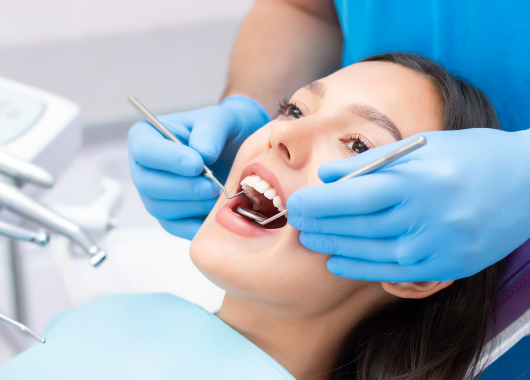Dental Care Mistakes You're Probably Making and How to Fix Them

Taking care of our teeth is something we all know we should do, but even with the best
intentions, many of us make simple mistakes that can harm our oral health. These
habits can lead to cavities, gum disease, and even tooth loss over time if left
unchecked. Let's dive into the 10 most common dental care mistakes you might be
making and how to fix them for a healthier smile.
1. Brushing Too Hard
It might seem logical that brushing harder would clean your teeth better, but this isn't the
case. Brushing too vigorously can wear down your enamel and cause your gums to
recede, leading to sensitivity and a higher risk of cavities.
The Fix: Use a soft-bristled toothbrush and gentle, circular motions. Think of it as
massaging your teeth rather than scrubbing them. This method is just as effective and
much gentler on your enamel and gums.
2. Skipping Flossing
Flossing often feels like an extra chore, but it's essential for removing food particles and
plaque from between your teeth and under the gumline. Ignoring this step allows
bacteria to accumulate, leading to gum disease and bad breath.
The Fix: Make flossing a daily habit. If traditional floss feels awkward, try using floss
picks or a water flosser to make the process easier and more effective.
3. Using the Wrong Toothbrush
Many people don't pay attention to the type of toothbrush they use, but choosing the
wrong one can lead to problems. Hard-bristled brushes can damage your enamel and
gums over time.
The Fix: Choose a toothbrush with soft bristles and a head size that fits comfortably in
your mouth. Replace your toothbrush every 3-4 months or sooner if the bristles become
frayed.
4. Brushing Right After Eating
Brushing immediately after a meal, especially if you've eaten something acidic (like
citrus or soda), can actually harm your teeth. The acids weaken your enamel, and
brushing right away can cause enamel erosion.
The Fix: Wait at least 30 minutes after eating before brushing. This gives your saliva
time to neutralize the acids and protect your enamel.
5. Neglecting Your Tongue
 Your tongue is a breeding ground for bacteria that can cause bad breath and plaque
buildup, yet it's often overlooked in dental care routines.
Your tongue is a breeding ground for bacteria that can cause bad breath and plaque
buildup, yet it's often overlooked in dental care routines.
The Fix: Clean your tongue every time you brush your teeth. You can use a tongue
scraper or gently brush your tongue with your toothbrush to remove bacteria and
freshen your breath.
6. Using Whitening Toothpaste Too Often
Whitening toothpaste can be a great way to brighten your smile, but using it too
frequently can cause damage. These toothpastes contain abrasive particles that can
wear down enamel if used excessively.
The Fix: Use whitening toothpaste only a few times a week and switch to a regular
fluoride toothpaste on other days. This will help protect your enamel while still allowing
you to enjoy a brighter smile.
7. Not Drinking Enough Water
Staying hydrated is not just good for your overall health—it's also crucial for your oral
health. Water helps wash away food particles, neutralizes acids, and keeps your mouth
from becoming dry.
The Fix: Drink plenty of water throughout the day, especially after meals. It's one of the
simplest ways to maintain a healthy mouth and keep bacteria at bay.
8. Snacking Throughout the Day
Frequent snacking might seem harmless, but it exposes your teeth to constant acid
attacks. Each time you eat, bacteria in your mouth produce acids that can weaken
enamel and lead to cavities.
The Fix: Limit snacking between meals, and choose healthier options like vegetables,
nuts, or cheese if you do need a snack. Rinse your mouth with water afterward to help
wash away food particles.
9. Ignoring Dental Check-Ups
Many people skip regular dental visits, especially if they're not experiencing pain or
problems. However, these check-ups are crucial for catching issues early and
preventing more serious problems down the road.
The Fix: Schedule a dental check-up every six months, even if your teeth feel fine.
Regular cleanings and exams can help keep your teeth and gums healthy and address
any potential issues before they become serious.
10. Using Your Teeth as Tools
We've all done it—used our teeth to open a package, tear off a tag, or hold something
when our hands are full. However, this habit can cause your teeth to chip, crack, or
wear down over time.
The Fix: Always use the proper tools for the job. Keep scissors, bottle openers, and
other tools handy, and resist the urge to use your teeth. They're meant for chewing
food, not performing DIY tasks!
These dental care mistakes might seem minor, but over time, they can have a
significant impact on your oral health. The good news is that with a few simple
adjustments, you can protect your teeth and gums, ensuring a healthier smile. By being
mindful of your brushing technique, flossing regularly, and keeping up with dental visits,
you're taking the right steps toward better dental health. Remember, your smile is worth
the effort!
